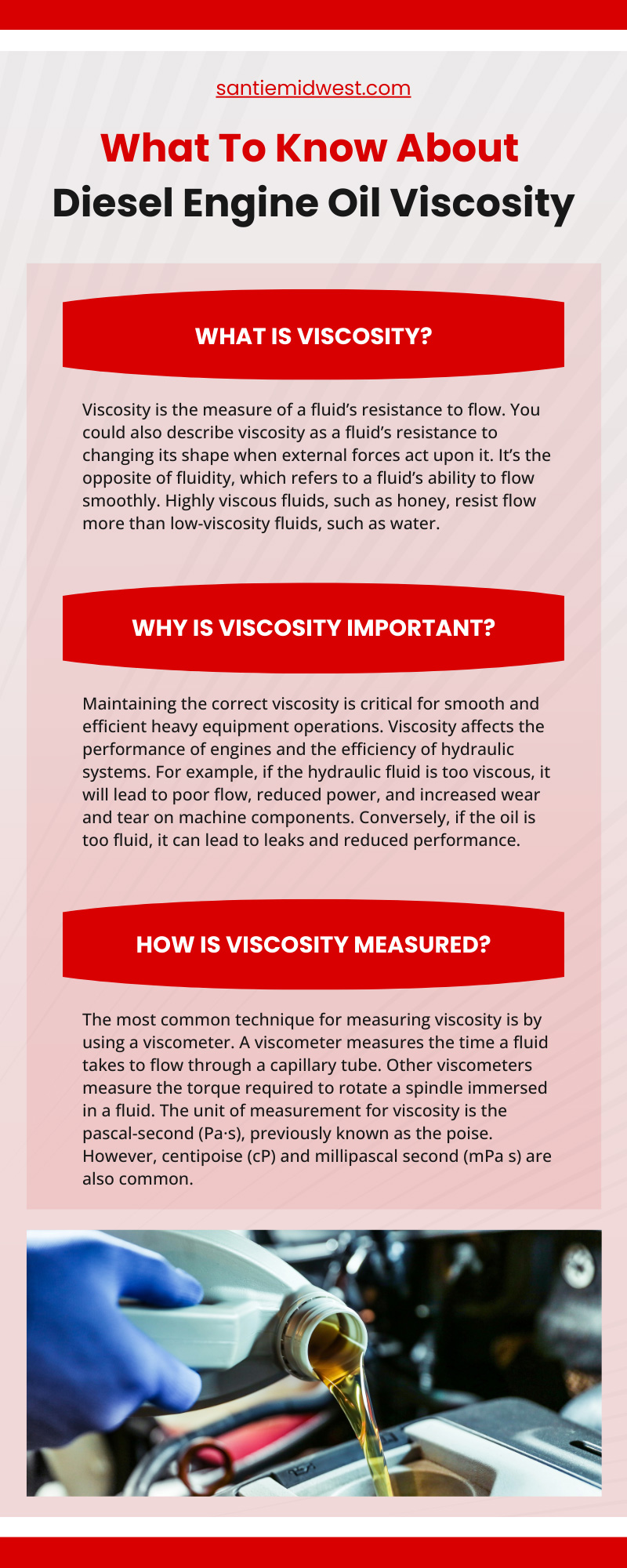Diesel engines are powerful machines that require high-performance lubricants to run efficiently. Construction, forestry, and mining are just a few examples of businesses that rely on diesel engines to power their machinery. One critical factor in determining the right oil for diesel engines is oil viscosity.
Viscosity can affect the performance and lifespan of your engine, so it’s essential to understand how it works. Explore everything you need to know about diesel engine oil viscosity to keep your engines running well.
What Is Viscosity?
Viscosity is the measure of a fluid’s resistance to flow. You could also describe viscosity as a fluid’s resistance to changing its shape when external forces act upon it. It’s the opposite of fluidity, which refers to a fluid’s ability to flow smoothly. Highly viscous fluids, such as honey, resist flow more than low-viscosity fluids, such as water.
It’s important to note that using the wrong oil viscosity can cause significant damage to your diesel engine, making it wear out faster or even fail altogether. You must follow the manufacturer’s recommendations for your specific engine to ensure you’re using the correct oil viscosity. Also, check the oil regularly to ensure it’s at the right level and that there are no signs of contamination or degradation.
Why Is Viscosity Important?
Maintaining the correct viscosity is critical for smooth and efficient heavy equipment operations. Viscosity affects the performance of engines and the efficiency of hydraulic systems. For example, if the hydraulic fluid is too viscous, it will lead to poor flow, reduced power, and increased wear and tear on machine components. Conversely, if the oil is too fluid, it can lead to leaks and reduced performance.
Most machinery manuals will provide a recommended viscosity range, and it is crucial to ensure that the fluid falls within this range to prevent damage to the equipment. The lubrication system in heavy machinery consists of several components, including the oil reservoir, oil filter, oil pump, oil cooler, and oil lines. Maintaining the proper viscosity level is essential to keep the lubrication system and the machinery running. Therefore, it’s critical to use the right-grade hydraulic fluids and lubricants.
How Is Viscosity Measured?
The most common technique for measuring viscosity is by using a viscometer. A viscometer measures the time a fluid takes to flow through a capillary tube. Other viscometers measure the torque required to rotate a spindle immersed in a fluid. The unit of measurement for viscosity is the pascal-second (Pa·s), previously known as the poise. However, centipoise (cP) and millipascal second (mPa s) are also common.
Manufacturers can present the results of viscosity measurements in a unit of measurement called centistokes (cSt). This unit represents the time it takes for a fixed volume of fluid to flow through a specific diameter tube. The higher the cSt value, the more viscous the fluid is. The ideal viscosity range for a given fluid depends on the machinery that it is used in and the temperature ranges it will experience.
What Is the SAE Rating?
A diesel SAE rating is a standardized method of measuring the viscosity of an oil subjected to certain conditions. SAE ratings consist of two numbers separated by a hyphen. Manufacturers typically mark diesel engine oil viscosity on the container with two numbers separated by the letter “W.”
The first number represents the thickness of the oil at low temperatures, while the second indicates its thickness at high temperatures. For instance, a 10W-30 oil is thinner than a 20W-50 oil when the engine is cold but thicker when it’s hot. In cold weather, the oil flows easier if it has a lower number before the “W.” However, it should be thick enough to provide adequate lubrication at high temperatures.
Determine the Operational Environment
One essential factor to consider when choosing diesel engine oil viscosity is the environment in which the engines will operate. In colder climates, thicker oil with a lower number before the W is ideal. Meanwhile, thicker oil with a higher number before the W is the better option in warmer conditions. High-viscosity oil provides better protection to the engine under high operating temperatures, reducing wear and tear and extending its lifespan.
Moisture from water mixing with engine oil can cause foaming and a loss of lubrication. In the event of a heavy rainstorm or operating near bodies of water, be sure to check your engine oil for signs of water contamination. It’s also important to be aware of higher altitudes, where the lower air pressure means your engine must work harder to generate power. As a result, the engine and oil may run hotter than they would at sea level.
Consider the Type of Engine
The type of engine also influences the choice of diesel engine oil viscosity. Engines with above-average clearances require thicker oil, while engines with tighter clearances need thinner oil to reduce friction and improve performance. The type of fuel you’re using also impacts the viscosity requirements. For instance, engines that run on biodiesel or alternate fuels may require a different oil viscosity than those that use regular diesel.
There are many diesel engine oils available on the market. Newer engines usually require lower viscosity oils than older engines, and purchasing your lubricant according to your engine type will ensure your machinery lasts as long as possible. Using the correct type of oil for your vehicle or equipment can bring several benefits, including improved fuel efficiency, reduced engine wear, enhanced performance, and extended engine life. Moreover, proper oil can help prevent sludge buildup, corrosion, and oxidation that can cause engine damage and decrease its efficiency.
Choose the Appropriate Oil for Your Equipment
There are quite a few things to know about diesel engine viscosity. Choosing the correct type is crucial to engine performance, lifespan, and reducing vehicle downtime. Understanding the significance of viscosity and selecting the appropriate oil for your engine is instrumental in getting the most out of your equipment.
Before purchasing diesel engine oil, consider the factors outlined in this post, such as the engine type, environment, and fuel type. Whenever in doubt, check with your engine manufacturer for recommendations on the best oil viscosity for your diesel engine. By using the proper oil viscosity, you can help improve engine performance and extend the life of your vehicles, enabling you to keep up with your heavy-duty needs without worry.


